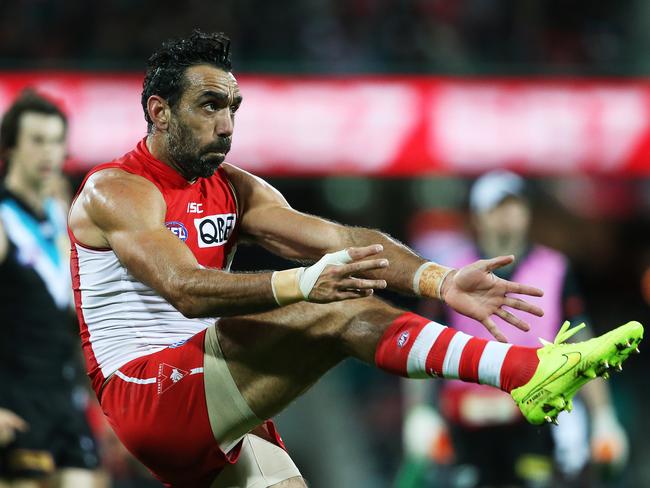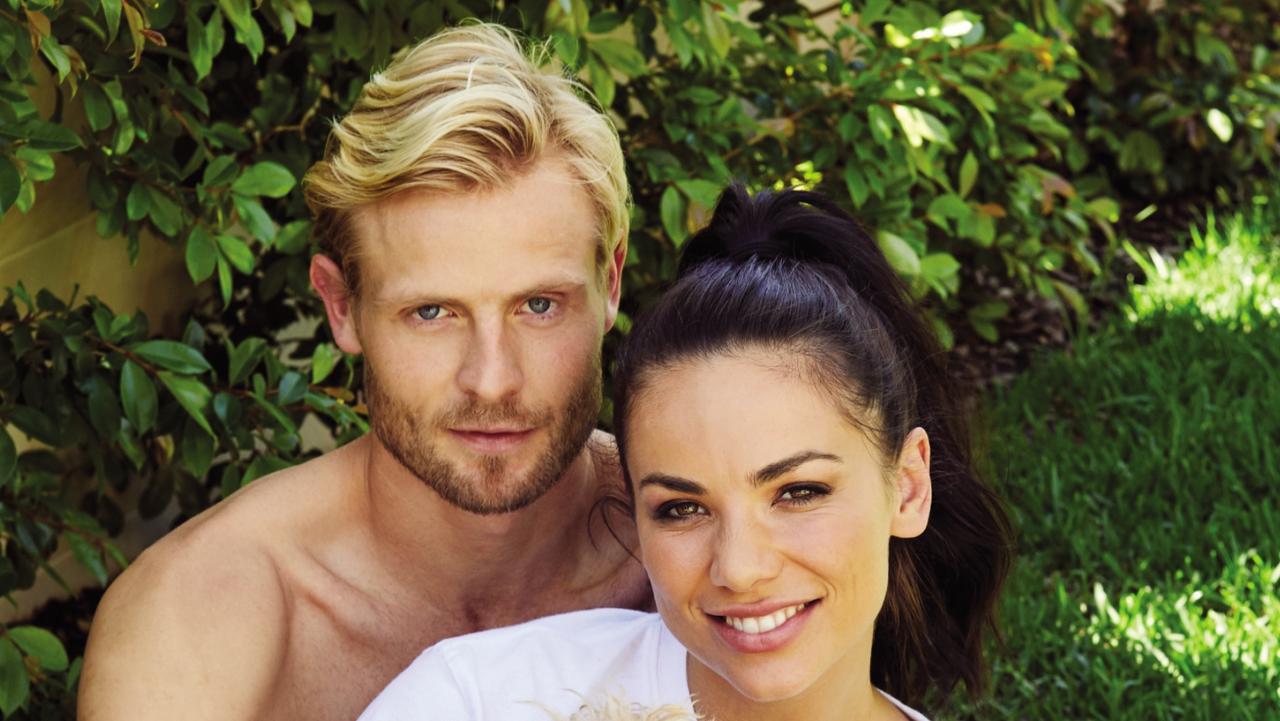Adam Goodes: ‘Being active saved me from a darker place’
“LIFE after football is great. My body feels strong. Mentally, I feel amazing because, for what feels like the first time in my life, I can make my own choices.” Those are the words from one of Australia’s greatest sportsmen — Adam Goodes.
Body+Soul Daily
Don't miss out on the headlines from Body+Soul Daily. Followed categories will be added to My News.
“LIFE after football is great. My body feels strong. Mentally, I feel amazing because, for what feels like the first time in my life, I can make my own choices.”
These words tumble out of Adam Goodes’ mouth when I ask how retirement from professional AFL is treating him.
As our interview continues, choice becomes a theme. Throughout Adam’s impressive 18-year career with the Sydney Swans, in which he became a dual Brownlow medallist and won two
premierships, he struggled with the lack of freedom that came with being an athlete.
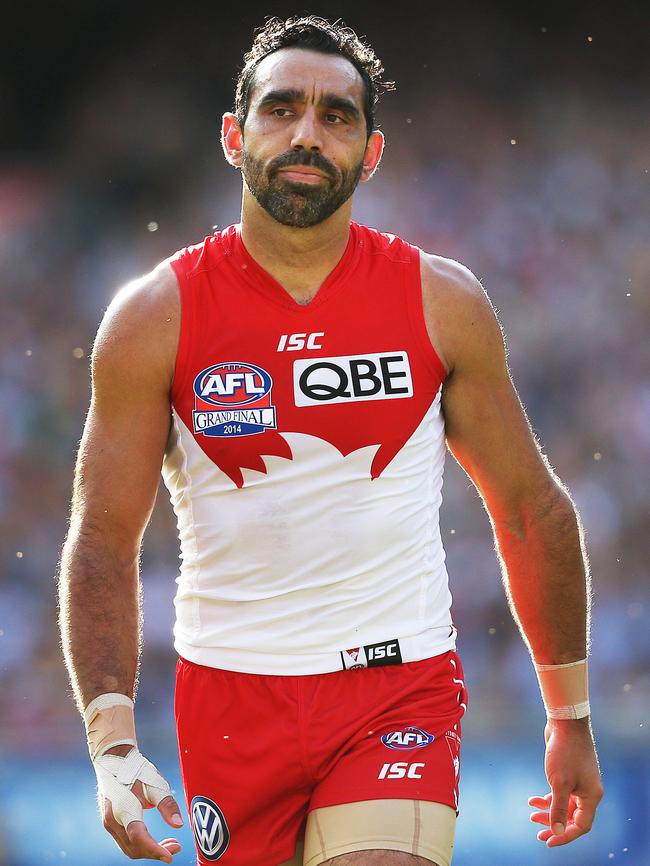
For almost two decades, the now 36-year- old was told how to train, what to eat, when to sleep and where to be at what time.
“I can’t tell you how refreshing it is to be able to choose when to exercise and then do it without a GPS unit on the back of my neck calculating the distance I’m covering, assessing the intensity I’m working at and checking whether I’m hitting the marks I need to,” he says.
When Adam was drafted by the Swans at age 17, his sole focus was football.
“Like any young guy, I felt invincible,” he admits.
“Whatever challenges I thought were ahead, I thought, ‘Nah, I’ll be right’. I exhausted my body and did whatever needed to be done to make playing that first game a reality.
At first, it was about playing that one game, and then it was 20 games. It was always about getting better physically. I didn’t think to check in with how that was making me feel.”
His determination and dedication paid dividends — Adam was named the league’s “Rising Star” in his first year — but it was a different story off the field.
“It was in my first three years of playing that I really battled mentally,” he says.
“Depression is different for everyone and I was never on medication but there were times I felt so, so down that I didn’t want to train, I didn’t want to be around people and I had no energy. Even though I had a job I’d worked so hard for and knew I loved, I just couldn’t get myself up or out of that feeling of haziness. That’s a form of depression.”
The first time Adam was hit by that dark cloud, he endured four weeks of feeling “like crap” before knocking on the Swans’ sports psychologist’s door. That was something he did fortnightly until hanging up his boots last year.
“Every time I walked out of that room, I felt so much better,” he says. “Sometimes we wouldn’t even talk about footy or anything particularly meaningful but having someone who wasn’t there to judge my performance or tell me what I needed to improve, just to listen, really helped.”
It’s why he’s spearheading David Jones’ new partnership with the Black Dog Institute, where 10 per cent of sales from activewear goes towards the mental health organisation until September 11.
Adam admits he was lucky to have an expert team of dietitians, physiotherapists, doctors and sports psychologists. He says, though, it was always up to the players to ask for help.
“That was something I chose to do.”
Training also helped combat the downs, which were often triggered by a lack of work/life balance.
“Being so active stopped me from going into an even darker place. I left everything at the gate when I ran out. When we lost two or three games in a row, that was the trigger. I’d try to fix it myself by training harder and making bigger sacrifices but that made me fall down the path faster.”
Instead, he learnt meditation, and the value of time alone and with family.
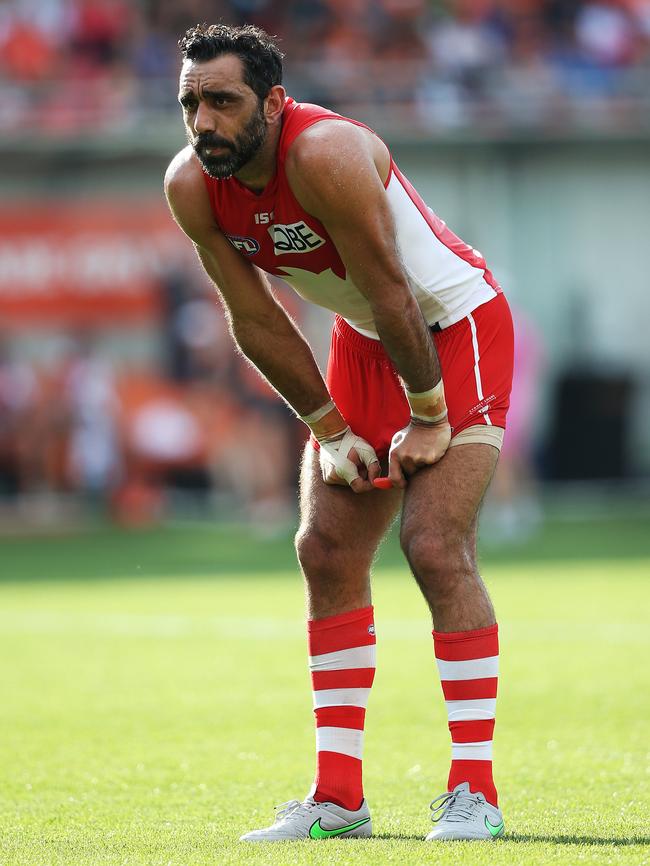
“My lowest points came when I tilted too far into my football life and I played my best footy when I set aside time for myself and focused on other things I was passionate about. Getting that balance right was what kept me strong mentally.”
Adam’s mental toughness has been tested in recent years. He has copped a barrage of racial abuse and mockery since demanding a young Collingwood fan be removed from the Melbourne Cricket Ground after she called him an ape. From then until the end of his record-breaking 372-game career, he was repeatedly booed by supporters of opposition teams.
“People seem to see me as a tough, 6-foot-3 footballer who weighs 100kg and can handle anything, but that’s just not right,” he says.
“I’ve become a very resilient person and I’ve learnt to be open about how things make me feel but that did catch up to me in the end.”
Amid the chaos, Adam was named the 2014 Australian of the Year. It was his tireless work with indigenous sport and community programs, troubled youth and the Go Foundation, which he co-founded, that earned him the honour. Yet the accolade did nothing to quieten the critics or stop the booing. It seemed to get louder.
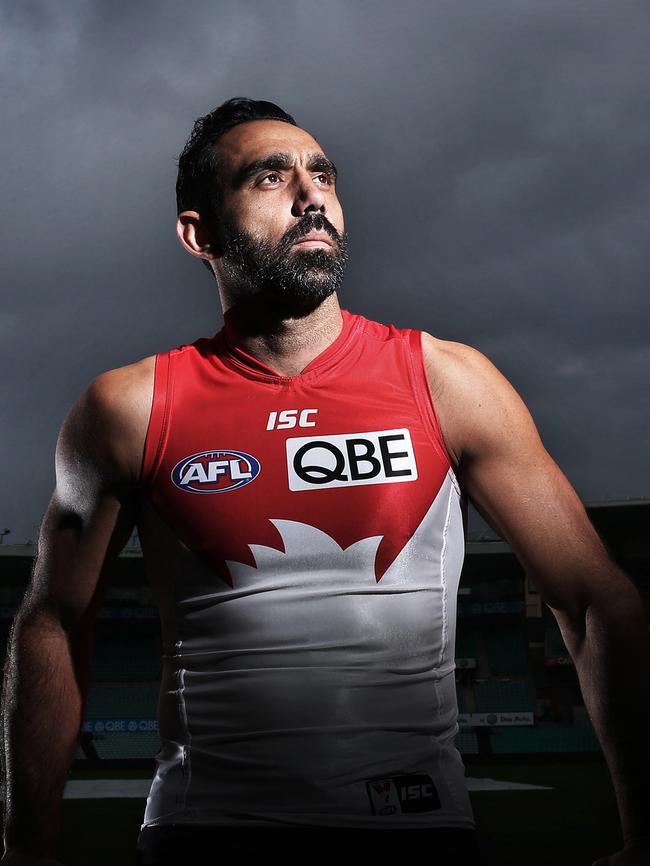
“When it was at its worst during my last season, we lost two games in a row and it became very hard to deal with. After 18 years of professional footy, I couldn’t believe that was how it was going to end.
All I wanted was to get away.”
So he did. He left Sydney, bound for the remote countryside, where he “put my feet in the river
banks and washed away all the crap I’d allowed to get in”.
“After that, it didn’t matter how other people behaved,” he says. “I was going out on my own terms, my own way.”
Retirement has put an end to the booing but not the racial abuse. Adam doesn’t use social media
anymore and deleted his Twitter account earlier this year.
“None of those people come up to me in the street and say those things — they wouldn’t have the courage — so I’ve chosen not to be part of a forum where they’re given a voice. I won’t let their voices be a part of my life. That’s my choice — and you always have a choice.”
Exercise as an antidepressant
“Exercise and mental health are linked in two important ways,” Dr Sam Harvey, psychiatrist and
associate professor at the Black Dog Institute, says.
“Firstly as a preventive measure and secondly as a treatment tool.”
Harvey was part of a research team that studied 40,000 people to see if there was a link between
physical activity and depression. The team found that inactive people were more than twice as likely to be depressed as those who spent more than three hours exercising each week.
Evidence suggests that working up a sweat can boost serotonin in the brain and inject a good dose of mood-lifting endorphins into the body.
Adam’s toolkit
MEDITATION:
“Meditation was a big thing for me — even back before it became a buzzword — and it still is. It’s about being in the moment and clearing my mind of all thoughts. It helps me to connect spiritually to my ancestors and culture, and really energises me as well.”
STRONG FAMILY TIES:
“Jumping in the ocean every day is how I get my daily dose of me-time. Family is so important to me,
so spending time with them also counts as me-time.”
WORKING OUT FOR FUN:
“Being able to exercise for fun is one of the best things about retirement. I’ve been playing soccer and basketball socially. I also walk with my partner (Natalie Croker) a lot. It’s a great way for us to spend time together and be active in the process.”
QUALITY REST:
“Sleep is so important. My life changes if I don’t get enough of it — I get very grumpy and short- tempered, which isn’t fun for anyone.”
TASTY TREATS:
“Abstinence and discipline are good for the body and soul — I truly believe that — but if I do
something really well, I’ll reward myself with a treat. It’s usually chocolate or biscuits. I’m also happy to eat healthy six days a week and then have a burger once a week.”
Get help: Contact Beyond Blue, 1300 22 4636
